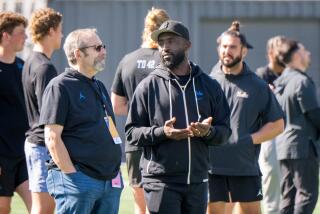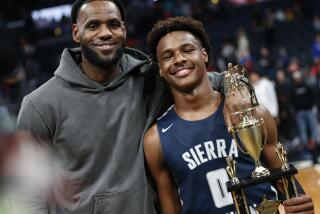Hiring process, not firing process, is at issue
UCLA fired Karl Dorrell on Monday, and now you can take one finger on one hand and use it to count on the other the number of African American head coaches remaining in major-college football.
Sylvester Croom (Mississippi State), Tyrone Willingham (Washington), Ron Prince (Kansas State), Randy Shannon (Miami) and Turner Gill (Buffalo).
Shouldn’t this list be getting longer, not shorter?
“It should,” Floyd Keith, executive director of the Black Coaches Assn., said Monday.
There was no indignation in Keith’s voice.
“I’m sad for Karl,” he said. “It’s unfortunate he had so many injuries this year. I wish they would have given him another year.”
Black, white, green or red, it’s tough to argue Dorrell didn’t get a fair shake.
UCLA gave a young coach a five-year chance and it didn’t work out.
Dorrell got sufficient time to breathe, grow and prosper. He was a Bruin, a former star receiver, part of the family. Dorrell was hired by Dan Guerrero, a minority athletic director.
Dorrell was not fired because he is black. He was fired for the same reason a lot of coaches are fired. He didn’t win enough, 35-27 in five seasons, and didn’t beat USC enough -- one time in five tries.
“The issue in this particular situation has nothing to do with race,” Guerrero said Monday. “It is really about performance and about my expectations of this program as we move forward.”
Chan Gailey, not a minority, had a winning record in six years at Georgia Tech but recently was fired for going winless against Georgia.
Mike Shula, at Alabama, didn’t beat Auburn often enough.
Dorrell couldn’t have picked a worse time to be UCLA’s first black football coach. He might have survived, maybe even thrived, had he been hired to compete against USC coach Paul Hackett.
Dorrell had the misfortune of learning on the job while Pete Carroll was leading USC to unprecedented success.
“It’s difficult when you’ve got that giant elephant, USC, standing in your backyard,” Keith said.
The BCA doesn’t have a problem with minority coaches getting fired.
“It’s a tough profession,” Keith said. “We understand that, there are casualties. It’s just the landscape of coaching. When people get involved in it, this is one of the hazards in it. Normally, you get around five to six years, then, if nothing’s happening, you start looking at it.
“Nothing is ever a shock when you get to that five-year period. I was getting phone calls in regard to this [Dorrell] probably a month ago.”
You know what really burns the BCA?
When Notre Dame fires Willingham after three years and then hires a coach, Charlie Weis, who ends up not getting fired after going 3-9 in his third year.
It burns the BCA when athletic directors make hush-hush side deals with coaches without even considering minority candidates in the hiring process.
Houston Nutt resigned at Arkansas and was hired at Mississippi before he could clean out his desk in Fayetteville -- so much for posting that job opening.
Texas A&M; reacted to Dennis Franchione’s departure by taking several minutes to consider the options before hiring another white coach, Mike Sherman.
“That’s what we’re fighting against,” Keith said. “We’ve never fought against the hire, we’ve fought against the process.”
Keith trusts Guerrero won’t just go through the motions in hiring UCLA’s next football coach.
“I think Dan will have a process,” Keith said. “I will be disappointed if that’s not the case.”
The paucity of African American coaches in college football is embarrassing. Five out of 119 is not a percentage to celebrate.
That deplorable batting average, though, should not negate UCLA’s right to make a coaching change.
Guerrero’s top priority is finding a coach who can raise the bar against the crosstown rivals. Race, color and creed should not enter into the equation.
The first bandied batch of possible successors to Dorrell -- Boise State’s Chris Petersen, Texas Tech’s Mike Leach and former San Francisco 49ers coach Steve Mariucci -- does not include a minority.
Maybe a few will emerge in the search.
A black coach currently on UCLA’s staff -- defensive coordinator DeWayne Walker -- might be the best man for the job.
Walker seems to know what it takes to slow USC’s machinery. He will always, in Bruins lore, be the coordinator who held USC to the nine in 13-9.
Walker seems to relish scheming against post-Norm Chow-era USC offensive coordinators. Walker was a member of Carroll’s first USC staff, in 2001, and appears to have insight into a mini-dynasty’s inner workings.
If UCLA doesn’t hire Walker, some other school might. Washington State has reportedly expressed interest.
However, Walker’s chances of getting the top spot at UCLA may be undermined by circumstances.
UCLA just took a chance on a minority coach with no previous head-coaching experience. Guerrero, understandably, might not want to go that route again.
Will there still be only five black coaches in a month?
“Everything has to play out,” Floyd Keith said. “With every day, the landscape changes.”
It changed Monday in Westwood.
Race wasn’t the issue, however.
Not winning (enough) was the issue.
--
Times staff writer Chris Foster contributed to this report.
More to Read
Go beyond the scoreboard
Get the latest on L.A.'s teams in the daily Sports Report newsletter.
You may occasionally receive promotional content from the Los Angeles Times.






